What happens on a Uefa A Licence course?
FFT joins a host of current and former players on the Uefa A Licence course at St George's Park to find out exactly what they do to get their coaching badges
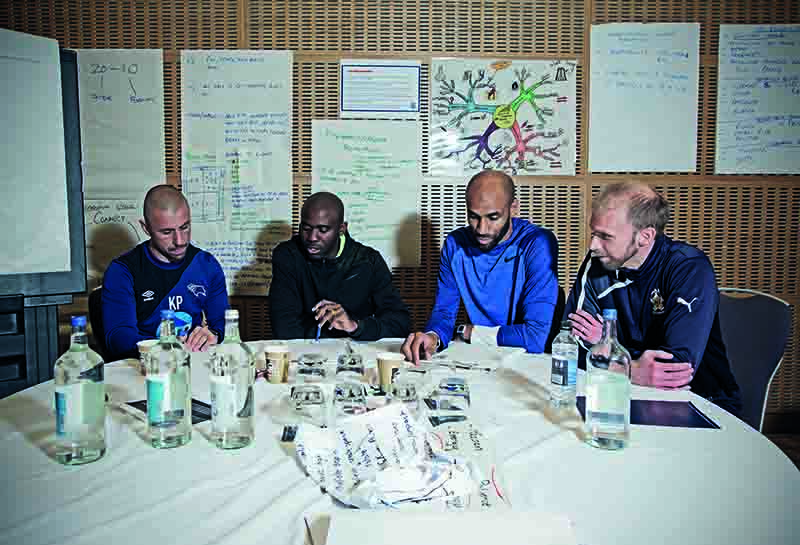
The sound of boisterous teenage boys and the barking voices of men grows louder as FFT approaches an 11-a-side pitch on a bitterly cold spring morning. Nearby, the occupants of two dug-outs huddle together for warmth, while laughing, back-slapping and exchanging stories like a pack of mischievous school kids.
But, these aren’t a random bunch of acne-ridden teens. Kevin Phillips and Luke Chadwick look out from one shelter. Darren Powell and Freddie Kanoute are interested spectators in the other. It’s a Thursday, 9am, and FFT are at St George’s Park for the sixth day of the FA Uefa A Licence senior pro course. We’re here to find out exactly what it takes to pass and whether it really prepares those involved for the rigors of football management.
Eighty-two current and former players are here on an eight-day residential stay – but it’s no holiday. The coaching boot camp will enable them to work at any academy on the planet and manage at every level below the Premier League. It’s the equivalent of gaining a football coaching degree.
On the pitch, Fabrice Muamba and former Burnley midfielder Wade Elliot are leading a possession-based training session. The pair are learning how a manager and coach work together to conduct a practice in tandem.They’ve been given a problem to solve. They’re only allowed to play on a limited area of the pitch and will have fewer players at their disposal than first thought.
Get FourFourTwo Newsletter
The best features, fun and footballing quizzes, straight to your inbox every week.
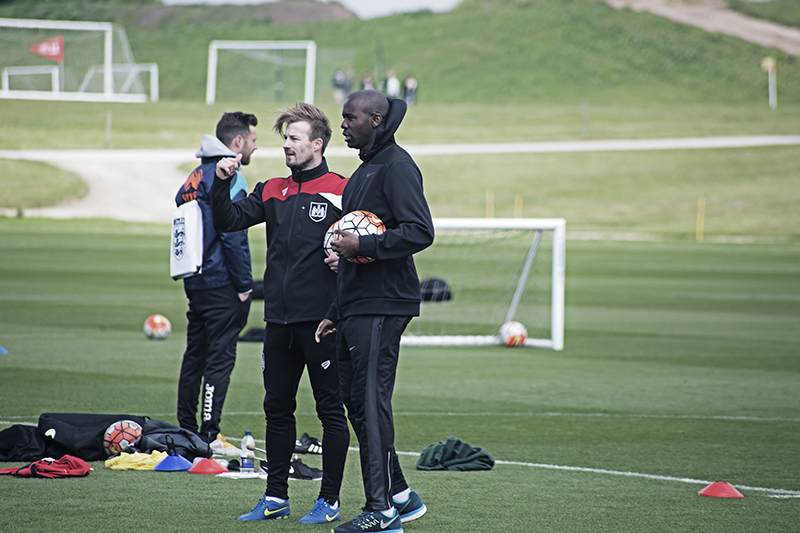
“It’s a simulation exercise based on what would happen at a club,” says course director Geoff Pike, who talks with the gusto of an East End cabbie.
“When I was a youth coach at Leyton Orient, the first team would come over after 20 minutes and take away two of my players. We have to teach them to have a plan B. If they can solve the problem, their credibility is enhanced in the eyes of the players.”
At £6055, the course isn’t cheap, though the PFA picks up 50% of the tab for retired players and those still playing the game. There’s a further 20% discount for FA Licensed Coaches’ Club members – a free membership service available to those taking their badges.
There are no shortcuts for big names, though. All participants must be Uefa B qualified before applying. Each application is then vetted by the course director, who assigns places to those with the best credentials. The intensity of the programme is relentless. Most days run from 9am-7:30 - the final session can often run until 9pm - and combine practical work on the pitch with theory sessions in the classroom.
For some, it’s been an eye-opener. “I’ve never drank so much coffee in my life,” jokes former Sunderland striker Kevin Phillips, as the players move inside for a mid-morning break.
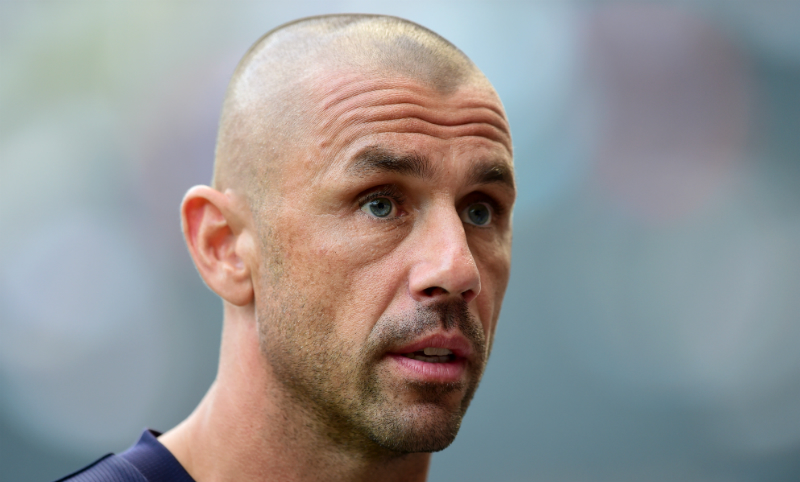
He joined Derby County as a first team coach at the start of last season having spent the previous campaign working under Nigel Pearson at Leicester City.
“As a player you’re used to starting at 10 and finishing at 12,” he says. Now it’s 8am and you don’t finish until 4 or 5. It took a lot of getting used to, but I was lucky Nigel gave me a lot of leeway – he knew I was going through a transition.”
It’s a working day Jay Blackie would happily swap. The Brighton & Hove Albion women’s captain combines her playing career with life as a high school teacher.
“I’m normally up at 6:30am, work in school 8-4, coach 6-8 and then train 8-10,” she says. “I get home at midnight and go straight to bed.”
She was initially meant to be on a female only course in February, but had to defer because of her playing season. This week is her half-term break – the only time she can fit the course in to her packed schedule. Blackie is the only woman on the programme. The lack of female attendees is partly explained by cost. Unlike her male peers, there’s no financial help for those in the women’s game.
“I’ve had to pay for the full lot,” she adds. “Luckily my dad helps me out.”
Opportunities are also slim. Only a handful of managers in the women’s game are full-time, yet all coaches are still required to pass their A Licence before moving into management. Blackie and the rest of the coaching tribe leave their coffee cups and go their separate ways. Some head for classrooms, others back outside for coaching practice.
FFT opts for the warmer option. Former Manchester United youth team coach Paul McGuiness is delivering a two-hour talk in a room that’s been wallpapered with post-it notes and A3 posters covered in tactical annotations. He shows pictures of Sir Alex Ferguson playing games with academy players and Danny Welbeck and Marcus Rashford laughing on summer trips abroad during their early teens.
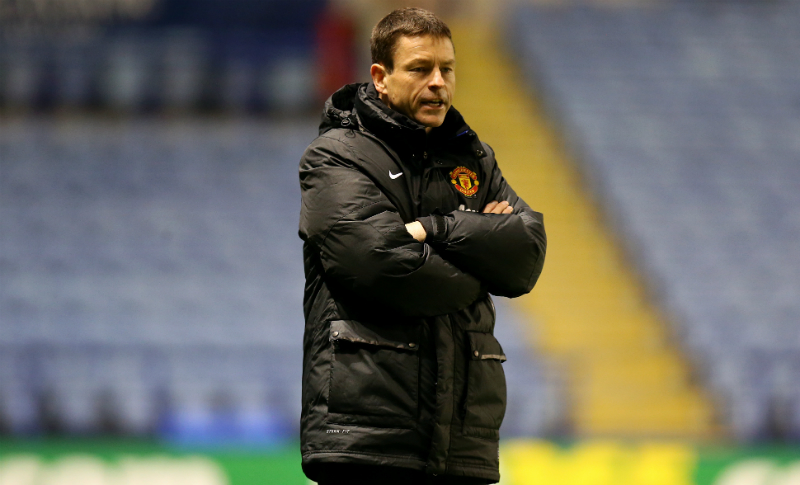
“It’s important that young players have fun,” he says. “Before training we’d put on a DVD of George Best, Maradona or Ronaldo doing tricks and ask the players ‘who wants to be Maradona?’
“We did a lot of work with Rashford. He always wanted to be the No.10 and drop deep, but we wanted him running in behind because of his pace. We taught him to receive the ball side on and burst past defenders. But we didn’t just tell him what to do. We taught him that it was fun to score goals and said people would notice him a lot more if he scored more goals. We want coaches to have fun with players.”
But how much fun can coaches have when they’ve got mouths to fill and a mortgage to pay? “There’s pressure to earn a living,” says Morecambe manager Jim Bentley. “I played most of my career at League Two, I have to earn to pay bills. You’re always looking over your shoulder.”
After five years in charge, he’s already the fifth longest-serving manager in English football. The average tenure is just 17 months. But having finished one place above the League Two relegation zone last season, he knows his future is far from certain.
“Hopefully I move up the divisions, but I may have to work in non-league at some point. Tactically I need to get better and I want to be an adaptable coach who can work with young players as well as senior players. This course has been brilliant for that – it’s been fascinating learning off people who have won European Cups and Premier League titles.”
Lunch is a hot buffet served in a canteen, where players split into playground cliques and discuss the morning’s work. Much of the chitchat is about how to get instructions across to players.
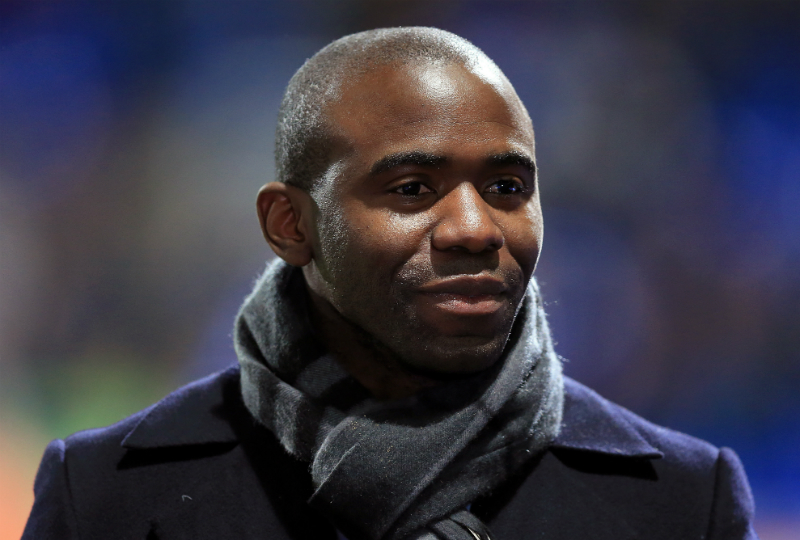
“The aim of the course is to get them to understand the ‘how’ bit of coaching,” says Pike. “How do you get your players to understand what you want them to do? Too often we see managers giving players too much information.”
Phillips weighs into the debate. “Working with Claudio Ranieri was an eye opener. He’s got wonderful humour, he understood English banter. In meetings he would take stick and give it back.
“But the key was his instructions were so clear. Players would come out of meetings and say to each other ‘I know what I’m doing on Saturday’. I’ve been in a lot of dressing rooms where players have come out confused.”
Muamba remembers working with Arsene Wenger at Arsenal. “He’d always give the players the responsibility to find a solution rather than just telling them the answer. It gave the players confidence and created trust between them and the manager.”
FFT has clocked former Blackburn Rovers striker Matt Jansen slipping out of a set of double doors. This afternoon he’ll lead a coaching session in which he must teach a defence which passes they can allow the opposition to make and which they must prevent.
By the time we catch up with him, he’s stood in the middle of a vast indoor pitch wearing a headset like a step aerobics instructor. He’s being filmed, while two tutors stationed on the touchline are monitoring his every move and listening to his instructions through an earpiece.
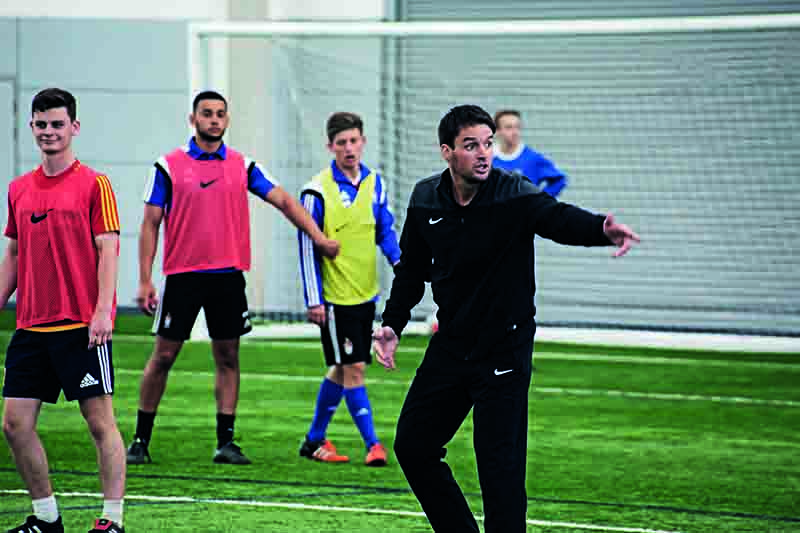
Neil Bailey has been assigned as Jansen’s tutor. At the end of the eight-day course, he’ll visit him in his club environment for a minimum of a further 30 hours of one-to-one coaching. All the coaches undergo the same process.
“It’s not an exam,” he says. “In schools we teach kids to pass exams, but that’s not learning. We want to work with the coaches while they’re on the job – that’s how you learn. Once we think they’re competent in all areas of the trade, they’ll get their certificate.“
Bailey says Jansen still has room for improvement. “We’re looking at how he’s organised the session, how he’s managed the session, and his observation and communication skills. Sometimes his positioning prevents him from seeing certain things, but we’ll work on that.“
According to Pike, it’s a common mistake made by ex players as they get used to seeing the game from a coach’s perspective. “I remember working with Dennis Wise on his B Licence,” he recalls.
“He was stood in the centre circle doing a session, but he hadn’t said a word. Ten minutes in I tapped him on the shoulder and said ‘are you ok Dennis? He said ‘what the f*** is going on?’ He’d only ever watched the game from a player’s point of view.”
Jansen immediately watches his session back on a large widescreen TV by the side of the pitch. He’s also given a code by a member of staff, which he can use to view the footage on an iPad or his bedroom TV. But can this blur of technology really prepare him for the harsh reality of non-league football? It’s a world away from the 38-year-old’s day-to-day existence. He’s spent the last 12 months in charge of Conference North side Chorley FC after being promoted from his previous role as assistant manager following the departure of Garry Flitcroft.
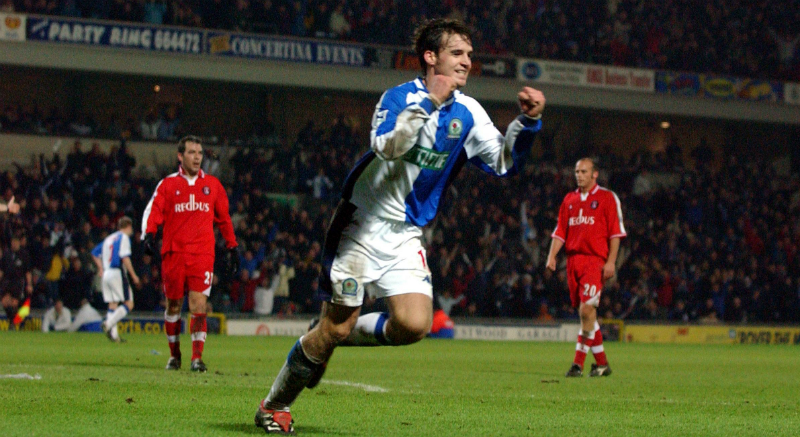
“I fell into the job,” he says. “A course can’t prepare you for it. When you lose a game as a player, you’re a bit p***** off. As a manager, it ruins your week. The highs and lows are more extreme – it’s like being bipolar.”
The mind is an area in which Jansen has an edge over his coaching peers. Back in 1999 he was a 23-year-old England international who had twice rejected Manchester United in favour of moves to Crystal Palace and Blackburn.
But his life and playing career was turned upside down after he was struck by a taxi while riding a motorbike on holiday with his girlfriend in Australia. He suffered a brain injury which nearly cost him his life. He made a full recovery but was never the same player after the accident. “My confidence was crushed,” he remembers. “I went to see brain specialists and kept complaining to the doctor that I didn’t feel right, but they didn’t know what was wrong with me.
“They put me in touch with a psychiatrist. Blackburn were great with me. Graeme Souness was my manager and he didn’t really understand it. He was a bit more old school – roll your sleeves up the Liverpool way – but he was still supportive.”
Jansen went to see Dr Steve Peters, who has most recently worked with Liverpool and England. “I must have had 100 hours with him after my accident, he even came to my wedding,” he continues. “My confidence would be in bits and then he’d bring me right back up. But a week later I’d deflate again.”
He says his personal experiences will prove more valuable in shaping his management style than any course. “The best managers deal with individuals. Sam Allardyce had sports psychologists to work with players one-on-one. You could sit and have a beer with Terry Venables. I can pass those lessons on to my players.”
The FA is keen to develop coaches with the same personal qualities. Without the beer of course. Back inside, they’re working on a psychology module, which aims to educate them on the mental side of the game. A discussion has begun about how players are motivated and the impact a coach’s words can have on different personalities. The class are again encouraged to share stories as part of the learning process.

Former Watford striker Gifton Noel-Williams recalls a tale about working with Tony Pulis at Stoke City. “Psychologically he was brilliant. He’d whisper in my ear, ‘these centre-backs are beating people up, they’re going to beat you up’. Then he’d tell Ade Akinbyi, ‘I’ve heard they’re saying you can’t run anymore’. It stewed in our heads.”
The group are also taught how to communicate in different ways. Head of Performance Analysis, Laura Seth, explains the importance of using video to illustrate points to an entire squad before a game and to individuals on the training ground using an iPad.
“At big clubs, coaches will have one, two or even three analysts, but lower down the pyramid some managers will be the analyst,” says Seth. “Using video and certain stats can accelerate the learning of players.”
With England, Seth and her team use an online platform called Replay Analysis. Individual player clips from training and games, opposition footage and match highlights are uploaded, which the national side can access via their iPhone, iPad or laptop. Players and staff can even chat using a comments tool.
The final talk of the day focuses on fitness. It’s a fitting finale - FFT is flagging at the end of a long day. The session informs coaches how to design sessions that will improve fitness while avoiding injury.
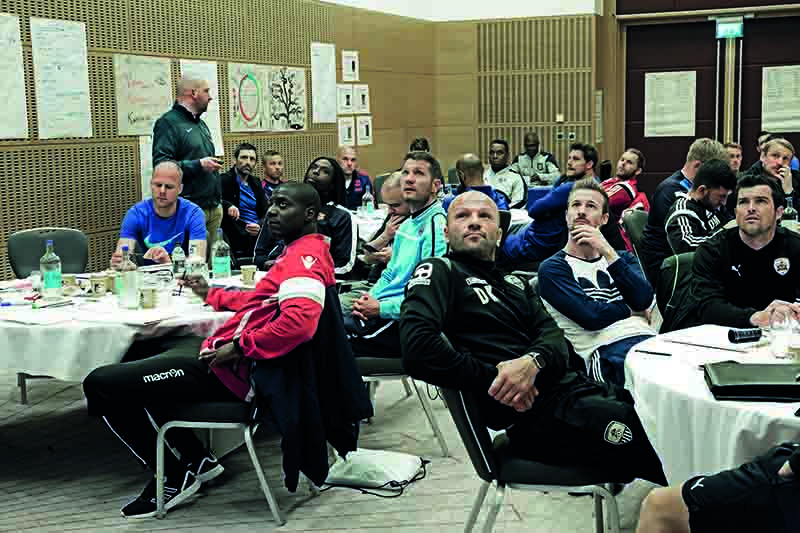
“If a manager prefers a pressing game, like [Jurgen] Klopp at Liverpool, the training needs to focus on short, sharp sprints,” says the FA’s performance expert Matt Portas. “It’s a lot more physically demanding than, say, a counter-attacking style like Atletico Madrid. The coaches must learn how to base their training around the system they use.”
Noel-Williams is keen to know more. He came through Watford’s youth system – where he now works as a coach with the club’s community trust - before playing alongside Michael Owen and Michael Bridges for England’s Under-21 side as an 18-year-old. However, he developed rheumatoid arthritis in multiple joints in his body after sustaining a broken kneecap following a tackle by Sunderland’s Paul Butler. In one bizarre twist, former Hornets chairman Elton John paid for him to try a course of pills he’d come across in America in a bid to save his career. He was eventually forced to retire aged 30.
“Some people look at my career and think I was one of those guys who didn’t work hard and wasted his talent,” he says. “A doctor told me to retire when I was 19 - he said I’d be crippled by 40 if I carried on. I laughed at him.
Unfortunately, not all managers have a thorough understanding of the human body. “Gianluca Vialli used to call me lazy and scared. He accused me of not wanting to play. I could run around for 90 minutes but then I couldn’t train for a week, he thought I was pulling a fast one.”
There’s homework at the end of a long day. To measure their understanding of the afternoon’s work, the coaches are required to put together a two-week training programme back at their clubs. Psychology, performance analysis and fitness techniques must be embedded within their coaching sessions. They must then deliver a presentation explaining their work to their tutors.
As the coaches file out of the room, FFT wonders what will be next for the class of 2016 once they’ve passed the course. Not all of them have ambitions of gracing Premier League dug-outs. Much like his playing days, Freddie Kanoute is in no rush. He currently runs two academies – one in Abu Dhabi where he now lives – and another in his homeland, Mali.
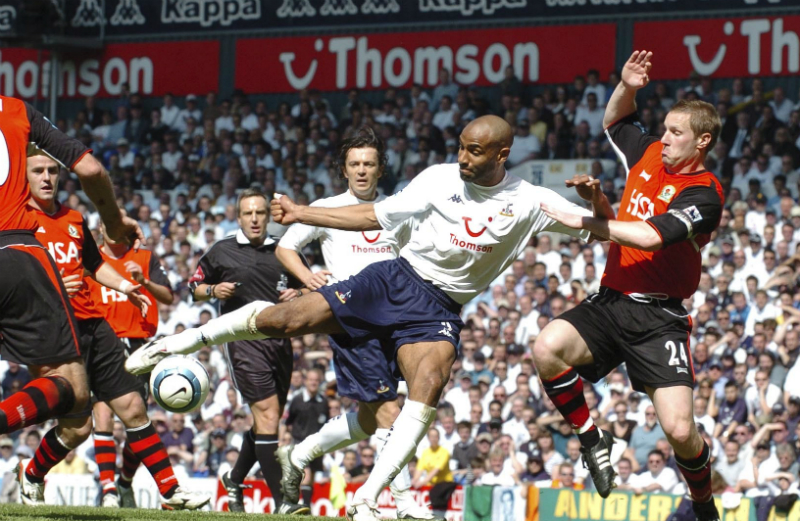
“I’m in no hurry to be a coach,” he muses. “This course was more to expand my personal knowledge. I wanted to know how to work better with my academy coaches. The biggest lesson has been getting my players to understand what I want them to do.”
Luke Chadwick, who at 35 still has the look of a gawky university student in his baggy Cambridge United tracksuit – was recently appointed the club’s Foundation Phase Lead coach. The role will see him oversee the development of the club’s young players up to the Under-12 group.
“I want to work with young players,” he says. “I’m not a very confident person and I thought that would hold me back in coaching but this experience has dragged me out of my comfort zone and given me a lot of belief in myself.
On Monday, Jay Blackie will start a new term at Blatchington Mill School & Sixth Form College, but sees her future in management. “I want to do it full-time once I’ve finished playing. I don’t want to balance jobs, I want to do it properly. The course has been a great experience – the biggest thing has been learning from other people’s stories.”
Noel-Williams is the last to leave. Like the rest of his peers, he will be eligible to take his ProLicence once he’s passed the course. Completing the final qualification would make him eligible to manage in the Premier League. But he knows there’s a long road ahead.
“There aren’t many jobs available and there aren’t many black managers in the game, but people like Chris Hughton and Chris Powell have shown if you’re good enough, you’ll get a chance. I want to manage at the very top. If I have to go abroad I’m willing to do it. I want to break the rules!“
Isn’t that what school’s all about?
